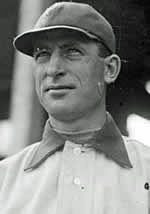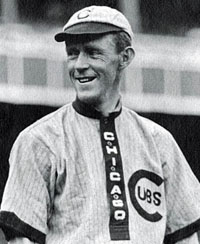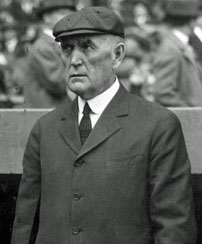These articles take us back to a moment in sports history
as reported in a newspaper the next day.
Merkle's "Bonehead" Play
This series of articles covers crucial games in the 1908 National League pennant race involving the Giants, Cubs, and Pirates. But first, an innocuous letter to the editor.
July 19, 1908: "Inquisitive Fans," a column of letters to the sports editor each Sunday in the Chicago Tribune
In the last half of the ninth, with the score tied, two men out and a runner on third, the batter hits to left and the runner scores. The batter, seeing the runner score, stops between home and first. The ball is throw to first baseman, who touches his base before the runner reaches it. Can runner score on this? Joseph Rupp, Chicago
Answer: No. Run cannot score when third out is made before reaching first base.
In the last half of the ninth, with the score tied, two men out and a runner on third, the batter hits to left and the runner scores. The batter, seeing the runner score, stops between home and first. The ball is throw to first baseman, who touches his base before the runner reaches it. Can runner score on this? Joseph Rupp, Chicago
Answer: No. Run cannot score when third out is made before reaching first base.
| Controversy in Pittsburgh I. E. Sanborn, Chicago Tribune |
|
Pittsburgh, Sept. 4 - In a magnificently pitched battle the Cubs received the short end of a 1 to 0 verdict in ten innings. But there is an outside chance that the defeat will be wiped out and the Cubs and Pirates ordered to do it all over again on the strength of a protest which the Cub management will file with [National League President Pulliam. ... Manager Clarke opened the Pittsburgh tenth with a single. Leach sacrificed him to second. Wagner then bounded a fast one toward right field. Evers almost made a brilliant stop but could only check the force of the ball enough to hold Clarke at third. Gill, a late recruit from the minors, was next and Brown soaked him in the slats with a curve, filling the bases with one out. Abby was then struck out. Wilson ... was next and what did this recent graduate from the minors do but soak the first ball Brown pitched on the nose. It went like a shot past Evers, landing safely in short center, and Clarke scored the winning run. Everybody thought it was over and started for the clubhouse. That everybody included First Baseman Gill and O'Day, and thereby hangs the protest. Gill ran halfway to second base and as soon as he saw |
the hit fall safely, he returned to the Pirates' bench. He did not go within 30 feet of second base at any time. Evers, seeing Gill's break for the bench, yelled for Slagle to throw the ball. Jimmy did and Evers touched second base with it, then wheeled to claim a force out, only to see Umpire O'Day making fast tracks for an exit with his back turned completely to what had been pulled off. Evers made his claim for the out, which retired the side and consequently wiped out Clarke's run, but the veteran umpire remarked: "Clarke was over the plate, so his run counted anyway." If O'Day [the lone umpire for the game] had watched the finish of that base hit and had seen what really came off, he could not have decided otherwise than in Chicago's favor, ruling out Clarke's run and leaving the score tied at 0 to 0. Everyone knows no run can count if the third out is made before the batsman reaches first, or if the third man out is forced out. Gill hadn't touched second base yet, and so Clarke's run could not have scored but for the fact O'Day took it for granted the game was over when Wilson's hit landed safe. |
 Fred Clarke |
 Johnny Evers |
 Hank O'Day |
New York Globe, September 9
President Pulliam has thrown out the Chicago club's protest of last Friday's game in Pittsburgh, and the 1 to 0 victory of Pittsburgh will stand. Chicago had affidavits of all kinds submitted by the Chicago club, but he and Chicago held that the game was fairly won, and that Chicago's kick was far-fetched. The Cubs couldn't prove their contention, so Mr. Pulliam backed up his umpire.
"I think the baseball public prefers to see games settled on the field and not in this office," said Pulliam.
President Pulliam has thrown out the Chicago club's protest of last Friday's game in Pittsburgh, and the 1 to 0 victory of Pittsburgh will stand. Chicago had affidavits of all kinds submitted by the Chicago club, but he and Chicago held that the game was fairly won, and that Chicago's kick was far-fetched. The Cubs couldn't prove their contention, so Mr. Pulliam backed up his umpire.
"I think the baseball public prefers to see games settled on the field and not in this office," said Pulliam.
| More Controversy September 24, New York Herald |
|
Rioting and wild disorder, in which spectators and players joined, causing a scene never witnessed in New York before, marked the conclusion at the Polo Grounds yesterday of the game between the Giants and Cubs. By cleverness in seeing an opportunity to deprive the Giants of their final and deciding run and quickness in seizing it, the Cubs had forced the umpire, Henry O'Day, to declare the game a tie, after half of the spectators had gone home in the belief that New York had won 2 to 1, and many of the New York players had left the field. Through what appeared to be the carelessness of a single player, Merkle, in leaving first base after Bridwell's winning run had been scored and retiring from the field without touching second base and with the ball still in play, the final score as it stood last night was 1 to 1 instead of a victory for the home team. In the fight between members of the opposing nines for the possession of the ball and the efforts of spectators, who rushed upon the field, to prevent the Chicago players from enjoying the fruits of their quick-wittedness, several players and the umpire were roughly handled and more or less severely hurt. Efforts of special policemen to clear the grounds were unavailing, and it took the regular policemen, called in from the outside, half an hour to quell the disturbance. No similar situation had ever been seen in the history of baseball in New York, When the eighth inning came to a close the score was 1 to 1, and the 20,000 enthusiasts that filled the grandstand and bleachers to overflowing were "rooting" for the Giants with desperate hope. Chicago failed to score in the first half of the ninth, and in the last half Bridwell went to bat with McCormick on third base and Merkle, who had replaced Tenney, on first. Bridwell made a clean hit over second base. McCormick raced home ... and there seemed nothing else to do but go home cheering. That is what most of the players did, and that, according to the decision rendered later by O'Day, is what young Mr. Merkle, the runner on first base, did. That little oversight of Merkle's gave Chicago their chance. The runner had been forced off first by Bridwell's hit. The ball was in centerfield. Hofman, covering that position, saw Merkle leave first base and saunter toward the clubhouse. He threw the ball to Evers, on second, but it went wild and [Giants P] McGinnity caught it. He had seen the opening left by Merkle's mistake as quickly as the Chicagoans, and had rushed out from the coaching lines to take a hand in the proceedings. With the ball in his hand, McGinnity also started for the clubhouse. [Cubs manager] Frank Chance got into action at this point and succeeded in holding McGinnity until other Chicago players could join in the effort to recover the ball. McGinnity, overpowered, |
threw the ball as far as he could into the crowd behind third base, the spectators having already begun to pile into the field. Steinfeldt and Tinker followed the ball into the crowd. Tinker seized it and threw to Evers, who stood proudly on second base holding the ball aloft, while O'Day, who had run down to second to see the play, was immediately surrounded by Chicago players. Chance ran to O'Day, claiming the run did not count because Merkle had been forced at second. A riotous mob at once surrounded the couple, and although most did not know what it was all about everyone evidently recognized a good opportunity to get a shot at the umpire. Those within reach began pounding him on all available exposed parts not covered by the protector, while the unfortunate attackers on the outskirts began sending messages by way of cushions, newspapers, and other missiles. A flying squadron of real police, reinforced by the special men, rushed O'Day to McGraw's coop under the grandstand and Chance was escorted off the field. Then the mob ran about the grounds throwing cushions and generally preparing for O'Day's reappearance, when it was made known that the game might not be given to the Giants. The police cleared the grounds and order was restored. O'Day, under the press of circumstances, did not render a decision on the field, but after he had dressed he told a reporter of the Herald that Merkle had not gone to second and the run did not count. He said a run could not be tallied on the third out if the man was forced and put out at second. Merkle said after the game that he had touched second en route for the clubhouse, and McGraw refused to say any more than that the game had been won fairly. O'Day seemed very uncertain as to what he should do and was a long time coming to a decision, and when he did he seemed uncertain as to its justification. Should he report the game to President Pulliam as a tie the New York club will protest, for there was ample police protection on the grounds to clear the field and continue the contest. The decision was really Emslie's, who was officiating on the bases, but he says he did not see the play, as he was watching first base, and O'Day had run out into the pitcher's box prepared to watch it. The same situation arose in Pittsburgh on September 4 ... [See article above.] Mr. Pulliam could not be seen last night up to a late hour, and he made no decision in the matter, but he gave out the following statement: "I made no decision in the matter, and I will not do so until it is presented to me in proper form." ... Last night he was closeted at the New York Athletic Club with O'Day and Emslie, and until he renders a decision the game stands on the umpires' decision that Merkle was forced at second. |
New York Evening Mail, September 24
"If," Christy Mathewson said, "this game goes to Chicago by any trick of argument, you can take it from me that if we lose the pennant thereby, I will never play professional baseball again.
"I had started for the clubhouse when I heard Chance call to Hofman to throw the ball to second. I remembered the trick they had tried to play on Pittsburgh and caught Merkle by the arm and told him to go to second. Merkle touched the bag. I saw him do it."
"If," Christy Mathewson said, "this game goes to Chicago by any trick of argument, you can take it from me that if we lose the pennant thereby, I will never play professional baseball again.
"I had started for the clubhouse when I heard Chance call to Hofman to throw the ball to second. I remembered the trick they had tried to play on Pittsburgh and caught Merkle by the arm and told him to go to second. Merkle touched the bag. I saw him do it."
New York Times, September 25
President Pulliam supported Umpires O'Day and Emslie and declared Wednesday's game a 1 to 1 tie. As neither club has an open date the tie contest will not be played off.
The end of the controversy, however, is not yet in sight, as [Giants] President Brush has served notice that he will appeal from the ruling, while [Cubs] President Murphy claims the game by forfeit, 9 to 0, owing to the fact that the New York team was not at the Polo Grounds yesterday at 1:30 to play off the tie game.
President Pulliam supported Umpires O'Day and Emslie and declared Wednesday's game a 1 to 1 tie. As neither club has an open date the tie contest will not be played off.
The end of the controversy, however, is not yet in sight, as [Giants] President Brush has served notice that he will appeal from the ruling, while [Cubs] President Murphy claims the game by forfeit, 9 to 0, owing to the fact that the New York team was not at the Polo Grounds yesterday at 1:30 to play off the tie game.
Cincinnati Enquirer, October 7
After two days of deliberation the National League Board of Directors reached a conclusion yesterday afternoon in the matter of the disputed game of September 23. The directors upheld the decision of the umpires and of President Harry C. Pulliam and declared the game a tie. They ordered it to be played off at the Polo Grounds tomorrow afternoon, or as soon thereafter as the weather will permit. Though the decision stretches the league constitution slightly, by extending the season beyond the date set by the regular schedule, the directors felt it was no more than fair to both clubs that this important contest be played off, and in this decision they have the baseball public with them.
After two days of deliberation the National League Board of Directors reached a conclusion yesterday afternoon in the matter of the disputed game of September 23. The directors upheld the decision of the umpires and of President Harry C. Pulliam and declared the game a tie. They ordered it to be played off at the Polo Grounds tomorrow afternoon, or as soon thereafter as the weather will permit. Though the decision stretches the league constitution slightly, by extending the season beyond the date set by the regular schedule, the directors felt it was no more than fair to both clubs that this important contest be played off, and in this decision they have the baseball public with them.
CONTENTS